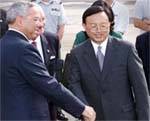Powell Arrives in Beijing, Visit may Further Bilateral TiesThis is Powell's first visit to China after he took office as the US secretary of state. It is learned that Powell will meet with some Chinese leaders during the visit, which is scheduled to end Sunday. Visit may further tiesSino-US relations should enjoy smooth sailing despite some lingering clouds now that the difficulties of the past six months are largely past.Both sides seem to feel it is time to mend fences now even though the differences between the two remain wide. The unpalatable reality is that there has been a period of tension between China and the United States since Republican President George W. Bush took office in January and redefined the bilateral relationship as one of "strategic competition." The ill feelings hit a peak when a US reconnaissance plane collided with a Chinese jet off the Chinese coast in April. But the atmosphere has improved since the plane was returned to the United States early this month. Now comes US Secretary of State Colin Powell's visit to Beijing this weekend to offer a much-needed chance to enhance mutual understanding, further improve the atmosphere of bilateral relations and pave the way for President Bush's visit to China this fall. Before Powell headed for Beijing, he said that his country, rather than seeking enmity with China, wants to advance a more stable, constructive relationship with that "important and powerful" country. He also acknowledged the transformation China is undergoing thanks to its opening up and economic reforms. That's a new approach. The Chinese side responded warmly. Foreign Minister Tang Jiaxuan said that China knows that a good Sino-US relationship is in the fundamental interest of both peoples. But Chinese scholars are expressing concerns that the new US administration has not substantially changed its approach to China. "The improvement of atmosphere does not necessarily mean a fundamental policy change," said Wang Jisi, director of the Institute of American Studies under the Chinese Academy of Social Sciences. To explain the apparent change in US attitude, he cited a basic truth about American politics, that the leaders tend to move back to moderate, middle-of-the-road stances. The Bush administration had gone too far to the right, so Bush is now feeling the corrective force brought on by his party's loss of control in the US Senate. Other Chinese scholars said leaders must be wary not to confuse symbolic gestures with substantial action on the part of the Americans. "Powell was only speaking sense to point out that China is a nation that need not be seen as an enemy," said Zhu Feng, a vice-professor with the School of International Studies at Peking University. Zhu stressed that Powell's remarks should be interpreted from a rational, not emotional, point of view. "It is, first of all, a voice of reason, and a voice seeking better bilateral relations," Zhu said. The Bush administration has ushered in a radical departure from previous presidents' approaches to foreign affairs. From missile defences, global warming, small arms and biological weapons, the new president puts unilateralism before consensus or gradualism. With such a dogged "America first" attitude, the new US administration has antagonized many nations, including its allies. The hawkish rhetoric of some top officials in the US government also suggests an unfriendly redefinition of its China policy. Some US experts see it as normal for a new leader to test new policies. But some don't think that's what's happening here. "But the Bush administration's China policy is, in fact, very clear," argued Yan Xuetong, executive director of the Institute of International Studies at Tsinghua University. "Their goal is to contain China in the military field and to co-operate on bilateral economic issues." While Powell will discuss some economic issues, the visit will mainly focus on improving bilateral ties, Yan said. China and the United States have a great deal in common, especially their stated goals of promoting peace, stability and prosperity in the Asia-Pacific region and the world. "Though the US administration might have begun fine-tuning its approach on China policy, the fine tuning is not enough," said Wang of the Chinese Academy of Social Sciences. The Sino-US relations are at a crucial stage at present. To sustain the momentum, the US needs to do more. Above all, the United States should be discreet in words and deeds on the Taiwan question, Wang insisted. Officially, there has been no diplomatic change and the US still recognizes the one-China policy. But the unprecedented US arms sales to Taiwan earlier this year indicates a significant shift. "If the US really holds dear its commitment to one-China principle, why hasn't it urged the Taiwan authority to observe the same principle?" Wang asked. The US must devote more effort to prepare for emerging business opportunities upon China's entry into the World Trade Organization and Beijing's realization of the Olympic dream, Wang added. Commerce is king in the era of economic globalization. Two-way trade volume between China and the United States reached US$30.4 billion during the first five months of this year, with US exports to China climbing by 20.9 per cent. And direct US investment in China now stands at US$30 billion. That's proof that handling existing differences properly and ensure sound Sino-US relations will benefit all. |
| People's Daily Online --- http://english.peopledaily.com.cn/ |
